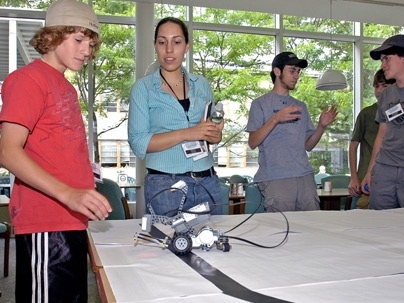In response to the growing popularity of robotics programs in high schools and elementary schools, several Lincoln Laboratory staff members have joined together to mentor students in robotics competitions. In the process, they're getting kids excited about science, technology, engineering and math --Â and the pride that comes with building high-tech equipment.
Members of the mentoring group, Robotics Outreach at Lincoln Laboratory (ROLL), are offering their time and engineering knowledge in workshops, classroom demonstrations and competitions.
Four Laboratory staff members conceived of ROLL after they were overwhelmed by demands for help while volunteering for recent robotics programs.
"I was asked to organize mentors for a robotics workshop at Boston University; the response was so overwhelming that teams of mentors had to be scheduled in shifts," said Jonathan Williams of the Air Defense Techniques Group, who formed ROLL with fellow Laboratory staff members Raquel "Rocky" Velez, Bryan Bonvallet and Joe Usoff. "Mentoring for robotics was an eye-opening experience for all of us. Afterward, we held a meeting to discuss how to better prepare for future events and ways to continue robotics outreach."
Each ROLL member manages a different aspect. Williams oversees mentoring duties. Bonvallet, of the Biodefense Systems Group, handles outreach, visibility, and communication. He has developed an internal wiki to promote group membership; 30 members have already signed up to volunteer.
Velez, of the Advanced Systems Concepts Group, is in charge of developing weekend robotics workshops for ninth- and 10th-graders. A pilot workshop in July, which introduced the kids to the engineering design process, proved so successful that ROLL plans to hold weekend robotics workshops throughout the school year.
Joe Usoff, of the Aerospace Sensor Technology Group, coordinated three teams of 9- to 14-year-olds to compete in the For Inspiration and Recognition of Science and Technology (FIRST) Lego League robotics competition in December as well as a high-school-age team that will compete in the FIRST Tech Challenge.
"Although Lincoln Laboratory has volunteered and mentored for the Boston FIRST competitions, this was the first time Lincoln Laboratory teams participated," Usoff said.
The FIRST Lego League competition is just one indicator of the growing popularity of robotics. Between 1998 and 2007, the number of children participating in the tournaments rose from 1,600 to more than 100,000.
Already, ROLL members are routinely fielding requests for mentors and demonstrations. Members have recently helped Boston high school students build robots as part of assistive technology project. "I was blown away by how motivated these kids were, using technology to help people with disabilities," Williams said. "It wasn't hard to find five more mentors interested in helping these kids."
Velez is particularly excited about coordinating the weekend robotics programs that let kids try out engineering in a full-immersion setting and team environment. Velez had such an opportunity when she was in high school, and it inspired her to choose science as a career.
"We want to take advantage of every opportunity to bring engineering to as many people as possible," she said.






